Unit 3 A day out 期末要点复习讲义+巩固测试
文档属性
| 名称 | Unit 3 A day out 期末要点复习讲义+巩固测试 |
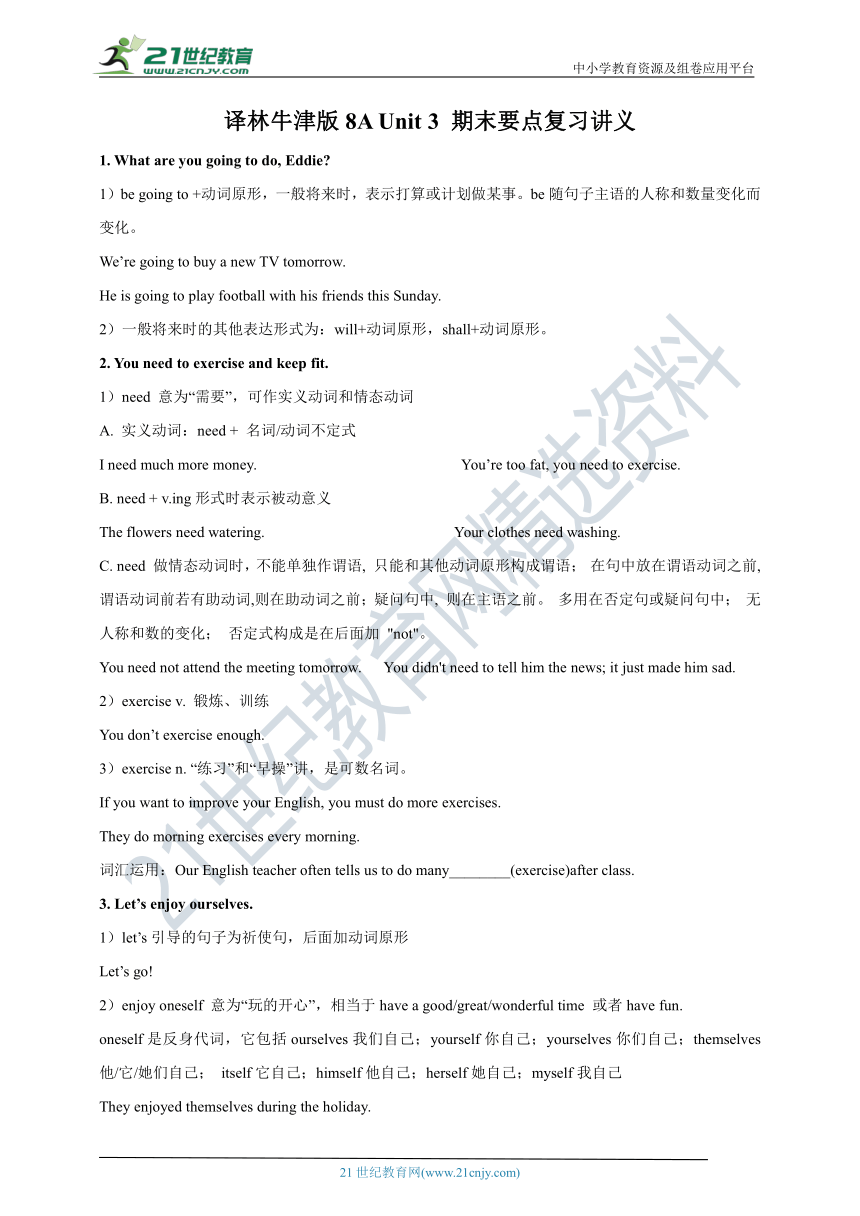
|
|
| 格式 | zip | ||
| 文件大小 | 1.2MB | ||
| 资源类型 | 试卷 | ||
| 版本资源 | 牛津译林版 | ||
| 科目 | 英语 | ||
| 更新时间 | 2018-12-24 21:07:34 | ||
图片预览

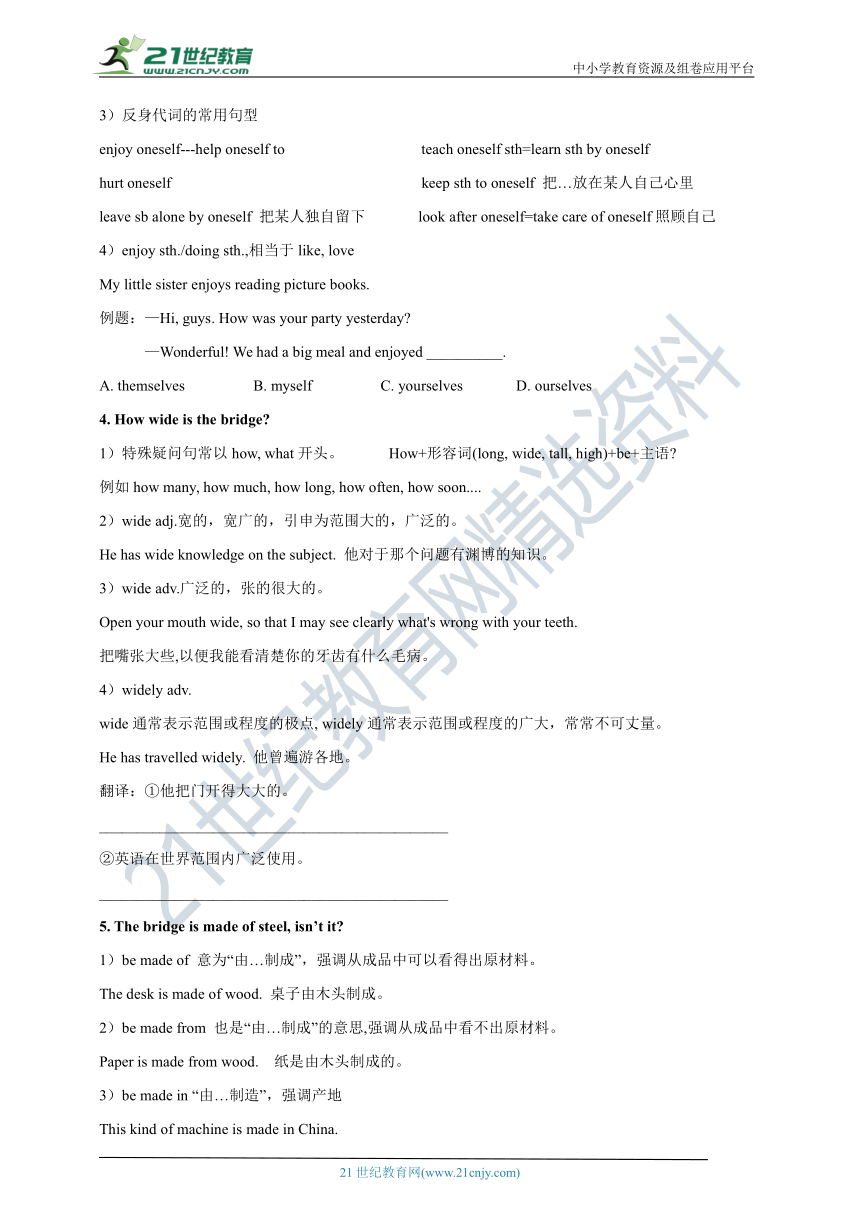
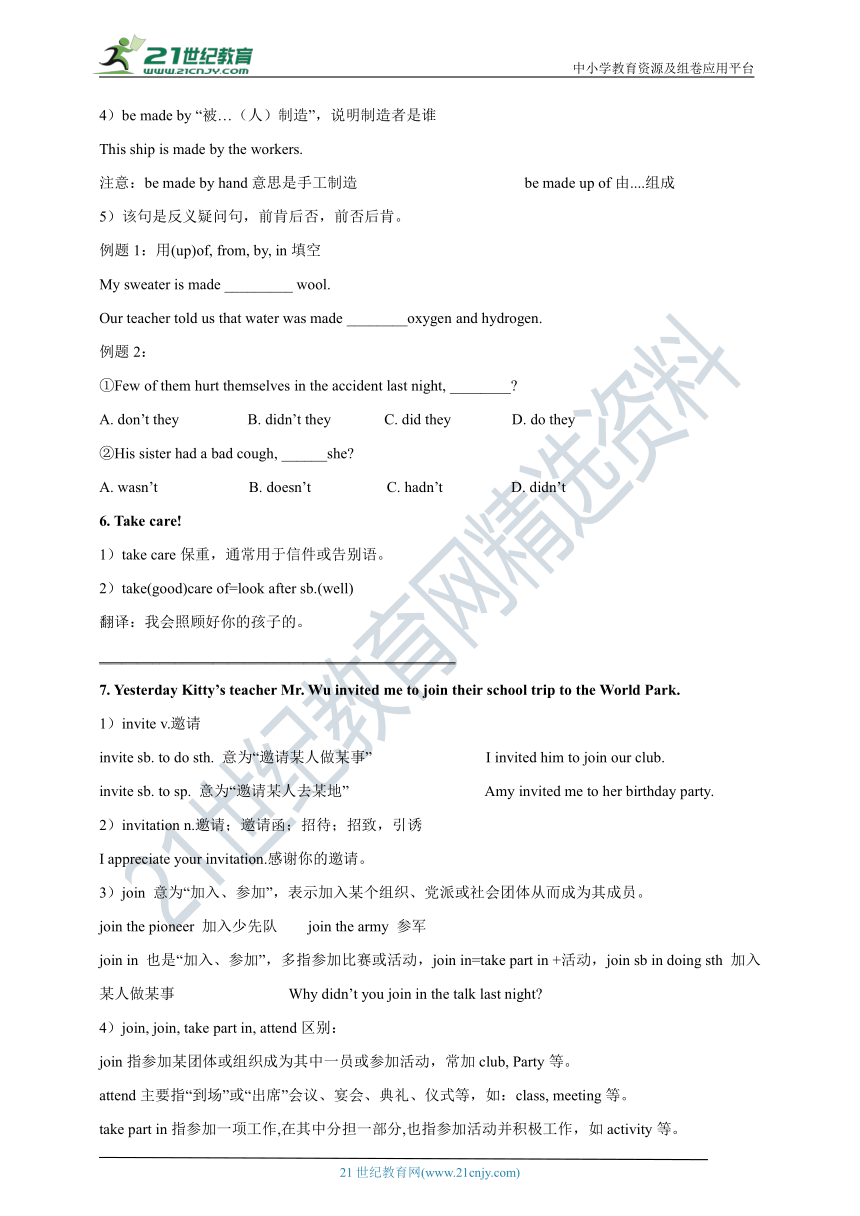
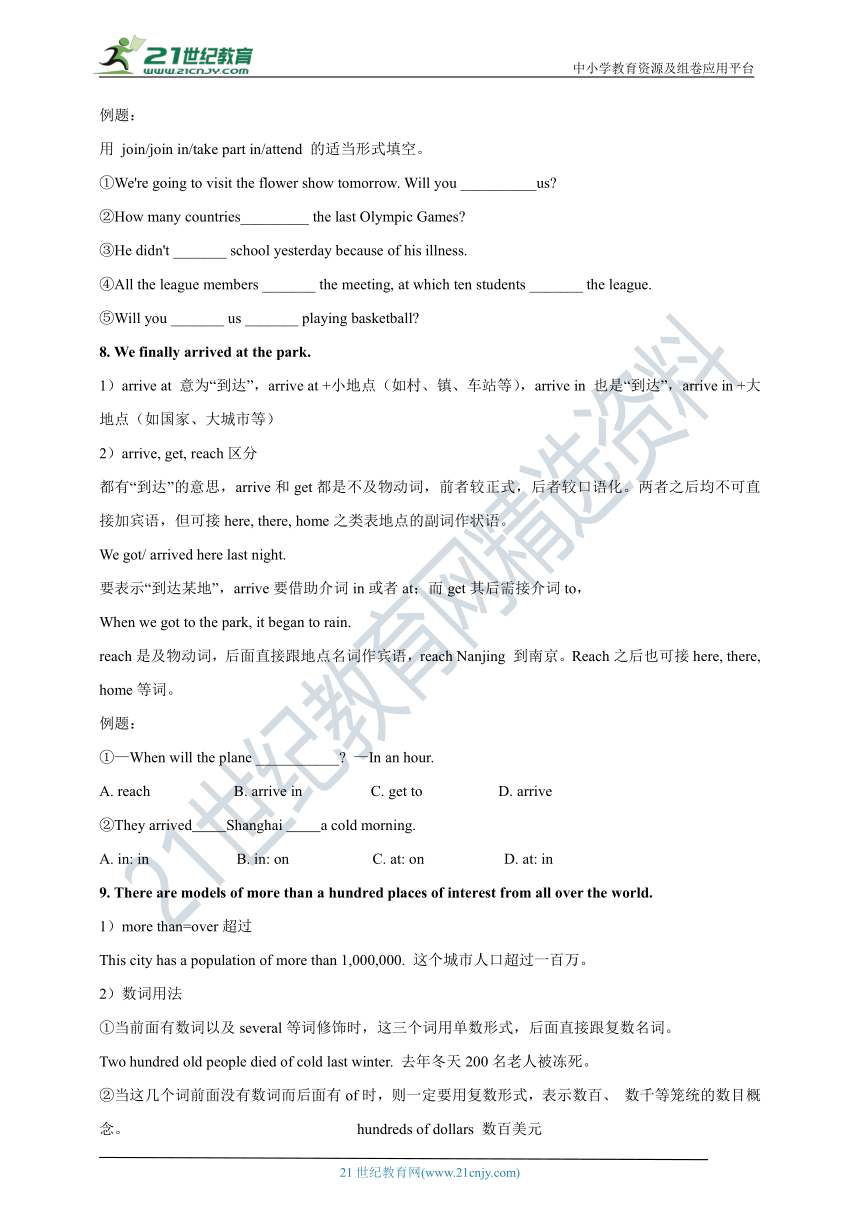
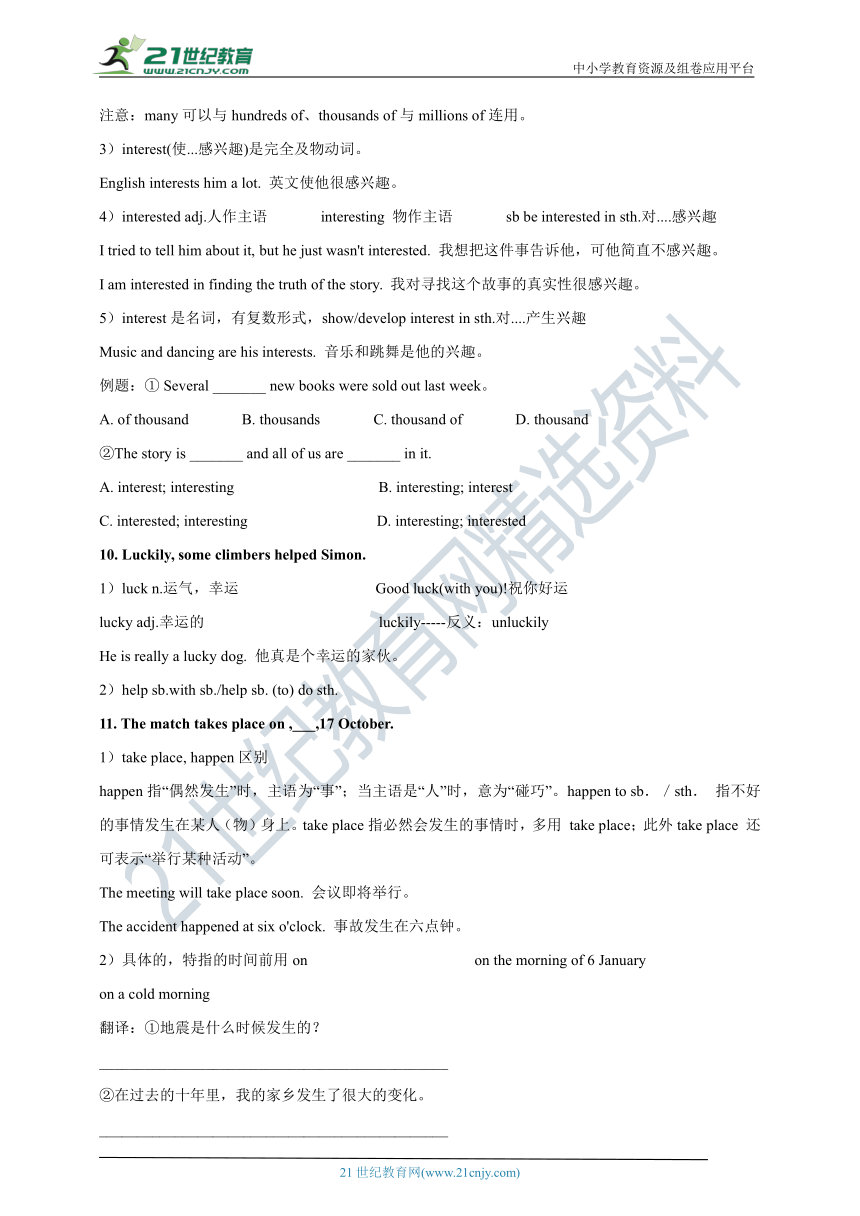
文档简介
中小学教育资源及组卷应用平台
译林牛津版8A Unit 3 期末要点复习讲义
1. What are you going to do, Eddie?
1)be going to +动词原形,一般将来时,表示打算或计划做某事。be随句子主语的人称和数量变化而变化。
We’re going to buy a new TV tomorrow.
He is going to play football with his friends this Sunday.
2)一般将来时的其他表达形式为:will+动词原形,shall+动词原形。
2. You need to exercise and keep fit.
1)need 意为“需要”,可作实义动词和情态动词
A. 实义动词:need + 名词/动词不定式
I need much more money. You’re too fat, you need to exercise.
B. need + v.ing形式时表示被动意义
The flowers need watering. Your clothes need washing.
C. need 做情态动词时,不能单独作谓语, 只能和其他动词原形构成谓语; 在句中放在谓语动词之前, 谓语动词前若有助动词,则在助动词之前;疑问句中, 则在主语之前。 多用在否定句或疑问句中; 无人称和数的变化; 否定式构成是在后面加 "not"。
You need not attend the meeting tomorrow. You didn't need to tell him the news; it just made him sad.
2)exercise v. 锻炼、训练
You don’t exercise enough.
3)exercise n. “练习”和“早操”讲,是可数名词。
If you want to improve your English, you must do more exercises.
They do morning exercises every morning.
词汇运用:Our English teacher often tells us to do many________(exercise)after class.
3. Let’s enjoy ourselves.
1)let’s引导的句子为祈使句,后面加动词原形
Let’s go!
2)enjoy oneself 意为“玩的开心”,相当于have a good/great/wonderful time 或者have fun.
oneself是反身代词,它包括ourselves我们自己;yourself你自己;yourselves你们自己;themselves他/它/她们自己; itself它自己;himself他自己;herself她自己;myself我自己
They enjoyed themselves during the holiday.
3)反身代词的常用句型
enjoy oneself---help oneself to teach oneself sth=learn sth by oneself
hurt oneself keep sth to oneself 把…放在某人自己心里
leave sb alone by oneself 把某人独自留下 look after oneself=take care of oneself照顾自己
4)enjoy sth./doing sth.,相当于like, love
My little sister enjoys reading picture books.
例题:—Hi, guys. How was your party yesterday?
—Wonderful! We had a big meal and enjoyed __________.
A. themselves B. myself C. yourselves D. ourselves
4. How wide is the bridge?
1)特殊疑问句常以how, what开头。 How+形容词(long, wide, tall, high)+be+主语?
例如how many, how much, how long, how often, how soon....
2)wide adj.宽的,宽广的,引申为范围大的,广泛的。
He has wide knowledge on the subject. 他对于那个问题有渊博的知识。
3)wide adv.广泛的,张的很大的。
Open your mouth wide, so that I may see clearly what's wrong with your teeth.
把嘴张大些,以便我能看清楚你的牙齿有什么毛病。
4)widely adv.
wide通常表示范围或程度的极点, widely通常表示范围或程度的广大,常常不可丈量。
He has travelled widely. 他曾遍游各地。
翻译:①他把门开得大大的。
______________________________________________
②英语在世界范围内广泛使用。
______________________________________________
5. The bridge is made of steel, isn’t it?
1)be made of 意为“由…制成”,强调从成品中可以看得出原材料。
The desk is made of wood. 桌子由木头制成。
2)be made from 也是“由…制成”的意思,强调从成品中看不出原材料。
Paper is made from wood. 纸是由木头制成的。
3)be made in “由…制造”,强调产地
This kind of machine is made in China.
4)be made by “被…(人)制造”,说明制造者是谁
This ship is made by the workers.
注意:be made by hand意思是手工制造 be made up of由....组成
5)该句是反义疑问句,前肯后否,前否后肯。
例题1:用(up)of, from, by, in填空
My?sweater?is?made?_________?wool.?
Our?teacher?told?us?that?water?was?made?________oxygen?and?hydrogen.?
例题2:
①Few of them hurt themselves in the accident last night, ________?
A. don’t they B. didn’t they C. did they D. do they
②His sister had a bad cough, ______she?
A. wasn’t B. doesn’t C. hadn’t D. didn’t
6. Take care!
1)take care保重,通常用于信件或告别语。
2)take(good)care of=look after sb.(well)
翻译:我会照顾好你的孩子的。
_______________________________________________
7. Yesterday Kitty’s teacher Mr. Wu invited me to join their school trip to the World Park.
1)invite v.邀请
invite sb. to do sth. 意为“邀请某人做某事” I invited him to join our club.
invite sb. to sp. 意为“邀请某人去某地” Amy invited me to her birthday party.
2)invitation n.邀请;邀请函;招待;招致,引诱
I appreciate your invitation.感谢你的邀请。
3)join 意为“加入、参加”,表示加入某个组织、党派或社会团体从而成为其成员。
join the pioneer 加入少先队 join the army 参军
join in 也是“加入、参加”,多指参加比赛或活动,join in=take part in +活动,join sb in doing sth 加入某人做某事 Why didn’t you join in the talk last night?
4)join, join, take part in, attend区别:
join指参加某团体或组织成为其中一员或参加活动,常加club, Party等。
attend主要指“到场”或“出席”会议、宴会、典礼、仪式等,如:class, meeting等。
take part in指参加一项工作,在其中分担一部分,也指参加活动并积极工作,如activity等。
例题:
用 join/join in/take part in/attend 的适当形式填空。
①We're going to visit the flower show tomorrow. Will you __________us?
②How many countries_________ the last Olympic Games?
③He didn't _______ school yesterday because of his illness.
④All the league members _______ the meeting, at which?ten students _______ the league.
⑤Will you _______ us _______ playing basketball?
8. We finally arrived at the park.
1)arrive at 意为“到达”,arrive at +小地点(如村、镇、车站等),arrive in 也是“到达”,arrive in +大地点(如国家、大城市等)
2)arrive, get, reach区分
都有“到达”的意思,arrive和get都是不及物动词,前者较正式,后者较口语化。两者之后均不可直接加宾语,但可接here, there, home之类表地点的副词作状语。
We got/ arrived here last night.
要表示“到达某地”,arrive要借助介词in或者at;而get其后需接介词to,
When we got to the park, it began to rain.
reach是及物动词,后面直接跟地点名词作宾语,reach Nanjing 到南京。Reach之后也可接here, there, home等词。
例题:
①—When will the plane ___________? —In an hour.
A. reach B. arrive in C. get to D. arrive
②They arrived?????????Shanghai??????????a cold morning.
A. in: in??????????? B. in: on???????? C. at: on????????? D. at: in
9. There are models of more than a hundred places of interest from all over the world.
1)more than=over超过
This city has a population of more than 1,000,000. 这个城市人口超过一百万。
2)数词用法
①当前面有数词以及several等词修饰时,这三个词用单数形式,后面直接跟复数名词。
Two hundred old people died of cold last winter. 去年冬天200名老人被冻死。
②当这几个词前面没有数词而后面有of时,则一定要用复数形式,表示数百、 数千等笼统的数目概念。 hundreds of dollars 数百美元
注意:many可以与hundreds of、thousands of与millions of连用。
3)interest(使...感兴趣)是完全及物动词。
English interests him a lot. 英文使他很感兴趣。
4)interested adj.人作主语 interesting 物作主语 sb be interested in sth.对....感兴趣
I tried to tell him about it, but he just wasn't interested. 我想把这件事告诉他,可他简直不感兴趣。
I am interested in finding the truth of the story. 我对寻找这个故事的真实性很感兴趣。
5)interest是名词,有复数形式,show/develop interest in sth.对....产生兴趣
Music and dancing are his interests. 音乐和跳舞是他的兴趣。
例题:① Several _______ new books were sold out last week。
A. of thousand B. thousands C. thousand of D. thousand
②The story is _______ and all of us are _______ in it.
A. interest; interesting B. interesting; interest
C. interested; interesting D. interesting; interested
10. Luckily, some climbers helped Simon.
1)luck n.运气,幸运 Good luck(with you)!祝你好运
lucky adj.幸运的 luckily-----反义:unluckily
He is really a lucky dog. 他真是个幸运的家伙。
2)help sb.with sb./help sb. (to) do sth.
11. The match takes place on ,___,17 October.
1)take place, happen区别
happen指“偶然发生”时,主语为“事”;当主语是“人”时,意为“碰巧”。happen to sb./sth. 指不好的事情发生在某人(物)身上。take place指必然会发生的事情时,多用 take place;此外take place 还可表示“举行某种活动”。
The meeting will take place soon. 会议即将举行。
The accident happened at six o'clock. 事故发生在六点钟。
2)具体的,特指的时间前用on on the morning of 6 January
on a cold morning
翻译:①地震是什么时候发生的?
______________________________________________
②在过去的十年里,我的家乡发生了很大的变化。
______________________________________________
12. Don’t forget to bring your friends.
1)祈使句否定句型常用don’t开头。
2)forget to do表示忘记去做某事,forget doing忘记做过某事。
I shall never forget meeting you for the first time. 我将永不会忘记第一次见到你的情景。
常见的搭配还有:remember doing/to do sth.
3)bring, take, carry的区别
bring 表示“拿来”,指从别处拿过来,方向一般是说话者,多指比较近的东西,也可以指带到一个说话人将要到达的地方,有时还可指由说话者随身带着(去某处),可以包括“带走”; take 表示“拿走”“带走”,指从此处拿出去,例如:When you go home take the letter with you.你回家去的时候,把信带去。fetch表示“去拿来”; carry则指“随身带着”,没有明确的方向性,同时强调体力方面的负担,可代替bring和take,例如:The mother carries her baby in her arms.母亲把小宝宝抱在怀里。
例题:—The light in the office is still on.
—Oh,I forgot___.
A. turning it off B. turn it off C. to turn it off D. having turned it off
13. We will go there by underground.
1)go there中there是副词,因此go to的to可以省略。类似结构还有get home, get there。
2)by underground 乘地铁。
A. 用“by+交通工具”表示交通方式。如:by bike, by bus, by car , by plane , by train , by subway 等。但是,“步行”用on foot , 而不是by foot. by + 表示交通工具的名词表示交通工具的名词表示交通工具的名词表示交通工具的名词,泛指“乘/坐某种交通工具”,其中名词前无任何修饰语名词前无任何修饰语名词前无任何修饰语名词前无任何修饰语,,,,且只能用单数且只能用单数且只能用单数且只能用单数。
B. 用"take a +交通工具”表示交通方式。如:take a bus , take a train , take a ship , 但“骑自行车”要用ride a bike 来表达
C. in/on + in/on + in/on + in/on + 表示交通工具的名词表示交通工具的名词表示交通工具的名词表示交通工具的名词 ,,,, 或泛指或特指“乘/坐某种交通工具”,其中名词前常有冠词、物主代词、指示代词或名词所有格等修饰语,名词可以是单数或复数。
14. The cost is about....
1)spend, pay, cost, take用法
spend(spent, spent) pay(paid, paid) cost(cost, cost) take(took, taken)
A. spend( 主语是人)
spend+ 时间/钱+ on sth. I spent 100 yuan on the dictionary.
spend+时间/钱+ (in) doing sth. He spends an hour doing his homework every day.
B. pay(主语是人) pay + (钱)+for sth. Sandy paid 10 yuan for the pen.
C.cost(主语是物) The pen cost Sandy 10yuan.
D. take(常跟在形式主语It 后, 或一件事做主语,只能表示花时间,不能表示花钱)
It took them two hours to get to the city centre by underground.
The trip from their school to the museum took them two hours by bus.
E. afford 支付得起 主语是人,afford sth. afford to do sth.
2)商品用cheap, expensive;价格用high, low;cost用little, much。
例题:①How much did the new skirt ______ you?
A. cost B. take C. spend D. pay
②—What about going to the concert this weekend?
—Sounds great, but the ticket is too expensive, I can't ________it.
A. spend B. cost C. pay D. afford
③The price of this computer is expensive.
(宜改为:This computer is expensive. 或The price of this computer is high. )
The price of this pen is not cheap for him to buy.
(宜改为:This pen is not cheap for him to buy. 或 The price of this pen is not low for him. )
译林牛津版8A Unit 3 期末要点复习讲义
2. exercises 3. D
4. ① He opened the door wide.
② English is widely used in the world.
5. 例1:of, from 例2:C; D
6. I can look after your child well. / I can take good care of your child.
7. ① join ②took part in ③ attend ④attended, joined ⑤ join, in
8. D; B 9. D; D
11. When did the earthquake happen?
Great changes have taken place in our hometown during the past ten years.
12. C 14. A; D
译林牛津版8A Unit 3 复习巩固测试
一、单项选择
1.(2018?新疆乌鲁木齐) There a folk music concert in Xinjiang Opera Theater next month.
A. is going to have B. will have C. is D. is going to be
2. (2018·广西梧州) Mr. Smith will arrive at our school next week.
The underlined part “arrive at” means ______.
A. get B. go C. come D. reach
3. (2018·新疆) —Wow, your sweater is very beautiful! How much is it?
—Thank you. It _______ me 30 dollars.
A. spend B. paid C. cost D. take
4. (2018·四川内江) —What useful book it is!
—Yeah, it tells you how to play the guitar.
A. an B. a C. the D. /
5. (2018·辽宁大连)—Mike, ________ do you go to work?
—I take a bus to my office every day.
A. how B. why C. when D. where
6. (2018·湖北鄂州) —Few of the passengers were hurt in the accident, ______ they?
—______, they were lucky.
A. weren’t, Yes B. were, Yes C. weren’t, No D. were, No
7. (2018·天津) Harry invited me________ with him when his parents were out of town.
A. stay B. stayed C. staying D. to stay
二、词汇
根据句意、首字母、英文释义或汉语提示,拼写单词:
1. (2018·贵州铜仁) Tom is old enough to take c______ of himself.
2. (2018·江苏苏州) How (幸运的) they are to have such a good teacher!
3. (2018·江苏宿迁) It’s __________ (not interesting) for me to stay at home all day long.
4. (2018山东莱芜) Tea plants are ______ (广泛地) grown in the south of China now.
三、完形填空
Our family went to Yellow Stone National Park for summer vacation. Our son, Tom, wanted to see bears there. And what a/an 1 trip it was! When we arrived there, we 2 our tent and went to explore(探索). As we returned, we heard our daughter Susie cry out suddenly. And then we saw a bear 3 into our camp. Tom wanted his father to drive the bear 4 .
“ No. It’s dangerous to chase(追赶)a bear. And don’t let him chase you.” His father said.
“What shall we do? Maybe we should 5 a tree.” Susie said.
“No. We have to get him out of there. He might go to sleep in our tent.” Tom said.
“Maybe we could make him leave if we put some 6 outside for him to eat,” Susie suggested.
Then I said, “ 7 can we get the meat? It’s in the tent.” Feeling helpless, we watched 8 bear go into the tent and heard him upset(弄翻)everything inside. “It’s foolish for us to try to chase him away,” said my husband. “ 9 him alone and wait for him to come out.” We waited and waited, 10 the bear stayed with no sign of leaving at all.
In the end, we had to sleep in the car that night.
1. A. interesting B. boring C. special D. unhappy
2. A. put on B. put up C. put into D. put out
3. A. to go B gone C. went D. going
4. A. off B. away C. back D. near
5. A. climb B. plant C. cut D. buy
6. A. water B. bread C. meat D. money
7. A. What B. Why C. Which D. How
8. A. the B. a C.不填 D. an
9. A. Make B. Tell C. Leave D. Send
10. A. but B. and C. so D. or
四、阅读理解
When I was fourteen years old, I made my first visit to the United States. It wasn’t the first time I had been abroad (Like many English children, I often went to France). So when I went to America, I thought I would have a nice easy holiday without any language problems.
How wrong I was! The misunderstanding(误解) began at the airport. I was looking for a public telephone to tell my American friend Danny that I had arrived. A friendly old man saw me looking lost and asked if he could help me.
“Yes,” I said, “I want to give my friend a ring.”
“Well, that’s nice,” he said, “Are you getting married? But aren’t you too young?”
“Who is talking about marriage(婚姻)?” I replied, “I only want to give my friend a ring to tell him I’ve arrived. Can you tell me where there is a phone box?”
“Oh,” he said, “there is a phone downstairs.”
When at last we met, Danny explained the misunderstanding to me.
“Don’t worry,” he said to me, “I had so many difficulties at first. There are lots of words which Americans use differently in meaning from British people. You’ll soon get used to all the funny things they say. Most of the time, British and American people understand each other.”
1. The writer was from _________.
A. Japan B. France C. America D. England
2. The writer thought ________ in America at first.
A. he wouldn’t have any language problems
B. he would be lost and he had to call the police for help
C. he wouldn’t understand the Americans
D. he would have a terrible holiday
3. The writer wanted to ________ at the airport.
A. have a meal B. buy a map C. call his friend D. find an old man
4. According to the friendly old man, “give somebody a ring” means “_____”.
A. make a telephone call to somebody B. be going to get married
C. buy a telephone for somebody D. ask somebody to wear a ring
5. The underlined word “they” refers to ________.
A. the old man and the boy B. the British
C. the French D. the Americans
五、书面表达
(2018·新疆)请以“My Traveling Plan”为题写一篇短文介绍你的旅行计划,提示信息如下:
1. Where are you going and who are you going with?
2. Why are you going there?
3. What are you going to do there?
要求:1. 书写清晰,字迹工整,行文流畅,语句通顺,内容完整;
2. 文中不得出现真实姓名、校名等信息;
3. 字数80—100词。
译林牛津版8A Unit 3 复习巩固测试
一、1—5 DDCBA 6—7 DD
二、1. care 2. lucky 3. boring 4. widely
三、1—5 CBDBA 6—10 CDACA
四、1—5 DACBD
五、
One possible version:
My Traveling Plan
I am going to travel in Beijing with my friends next month. Beijing is a beautiful city with a long history. It is the capital of China. I am going to stay there for several days. There are many interesting places. First i am going to visit Tian’anmen Square, the Summer Palace and the Great Wall. Then i am going to Wangfujing Street, there are a lot of stories there, I want to buy some gifts for my parents. And I am going to eat Beijing Duck there. How delicious it is!
21世纪教育网 www.21cnjy.com 精品试卷·第 2 页 (共 2 页)
HYPERLINK "http://21世纪教育网(www.21cnjy.com)
" 21世纪教育网(www.21cnjy.com)
